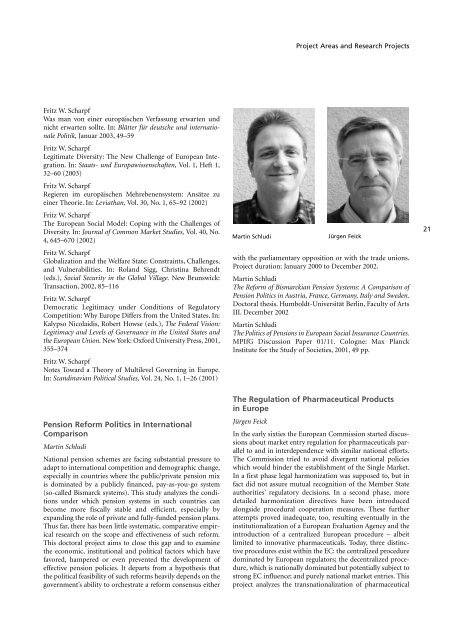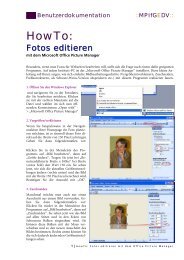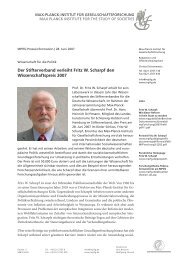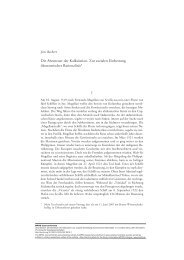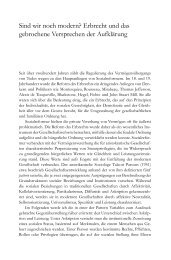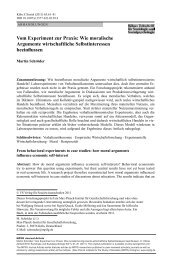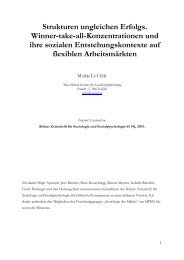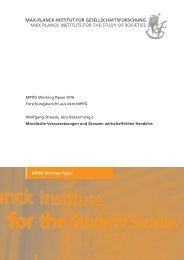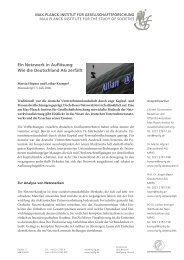Publications - MPIfG
Publications - MPIfG
Publications - MPIfG
You also want an ePaper? Increase the reach of your titles
YUMPU automatically turns print PDFs into web optimized ePapers that Google loves.
Fritz W. Scharpf<br />
Was man von einer europäischen Verfassung erwarten und<br />
nicht erwarten sollte. In: Blätter für deutsche und internationale<br />
Politik, Januar 2003, 49–59<br />
Fritz W. Scharpf<br />
Legitimate Diversity: The New Challenge of European Integration.<br />
In: Staats- und Europawissenschaften, Vol. 1, Heft 1,<br />
32–60 (2003)<br />
Fritz W. Scharpf<br />
Regieren im europäischen Mehrebenensystem: Ansätze zu<br />
einer Theorie. In: Leviathan, Vol. 30, No. 1, 65–92 (2002)<br />
Fritz W. Scharpf<br />
The European Social Model: Coping with the Challenges of<br />
Diversity. In: Journal of Common Market Studies, Vol. 40, No.<br />
4, 645–670 (2002)<br />
Fritz W. Scharpf<br />
Globalization and the Welfare State: Constraints, Challenges,<br />
and Vulnerabilities. In: Roland Sigg, Christina Behrendt<br />
(eds.), Social Security in the Global Village. New Brunswick:<br />
Transaction, 2002, 85–116<br />
Fritz W. Scharpf<br />
Democratic Legitimacy under Conditions of Regulatory<br />
Competition: Why Europe Differs from the United States. In:<br />
Kalypso Nicolaidis, Robert Howse (eds.), The Federal Vision:<br />
Legitimacy and Levels of Governance in the United States and<br />
the European Union. New York: Oxford University Press, 2001,<br />
355–374<br />
Fritz W. Scharpf<br />
Notes Toward a Theory of Multilevel Governing in Europe.<br />
In: Scandinavian Political Studies, Vol. 24, No. 1, 1–26 (2001)<br />
Pension Reform Politics in International<br />
Comparison<br />
Martin Schludi<br />
National pension schemes are facing substantial pressure to<br />
adapt to international competition and demographic change,<br />
especially in countries where the public/private pension mix<br />
is dominated by a publicly financed, pay-as-you-go system<br />
(so-called Bismarck systems). This study analyzes the conditions<br />
under which pension systems in such countries can<br />
become more fiscally stable and efficient, especially by<br />
expanding the role of private and fully-funded pension plans.<br />
Thus far, there has been little systematic, comparative empirical<br />
research on the scope and effectiveness of such reform.<br />
This doctoral project aims to close this gap and to examine<br />
the economic, institutional and political factors which have<br />
favored, hampered or even prevented the development of<br />
effective pension policies. It departs from a hypothesis that<br />
the political feasibility of such reforms heavily depends on the<br />
government’s ability to orchestrate a reform consensus either<br />
Project Areas and Research Projects<br />
Martin Schludi Jürgen Feick<br />
with the parliamentary opposition or with the trade unions.<br />
Project duration: January 2000 to December 2002.<br />
Martin Schludi<br />
The Reform of Bismarckian Pension Systems: A Comparison of<br />
Pension Politics in Austria, France, Germany, Italy and Sweden.<br />
Doctoral thesis. Humboldt-Universität Berlin, Faculty of Arts<br />
III. December 2002<br />
Martin Schludi<br />
The Politics of Pensions in European Social Insurance Countries.<br />
<strong>MPIfG</strong> Discussion Paper 01/11. Cologne: Max Planck<br />
Institute for the Study of Societies, 2001, 49 pp.<br />
The Regulation of Pharmaceutical Products<br />
in Europe<br />
Jürgen Feick<br />
In the early sixties the European Commission started discussions<br />
about market entry regulation for pharmaceuticals parallel<br />
to and in interdependence with similar national efforts.<br />
The Commission tried to avoid divergent national policies<br />
which would hinder the establishment of the Single Market.<br />
In a first phase legal harmonization was supposed to, but in<br />
fact did not assure mutual recognition of the Member State<br />
authorities’ regulatory decisions. In a second phase, more<br />
detailed harmonization directives have been introduced<br />
alongside procedural cooperation measures. These further<br />
attempts proved inadequate, too, resulting eventually in the<br />
institutionalization of a European Evaluation Agency and the<br />
introduction of a centralized European procedure – albeit<br />
limited to innovative pharmaceuticals. Today, three distinctive<br />
procedures exist within the EC: the centralized procedure<br />
dominated by European regulators; the decentralized procedure,<br />
which is nationally dominated but potentially subject to<br />
strong EC influence; and purely national market entries. This<br />
project analyzes the transnationalization of pharmaceutical<br />
21


